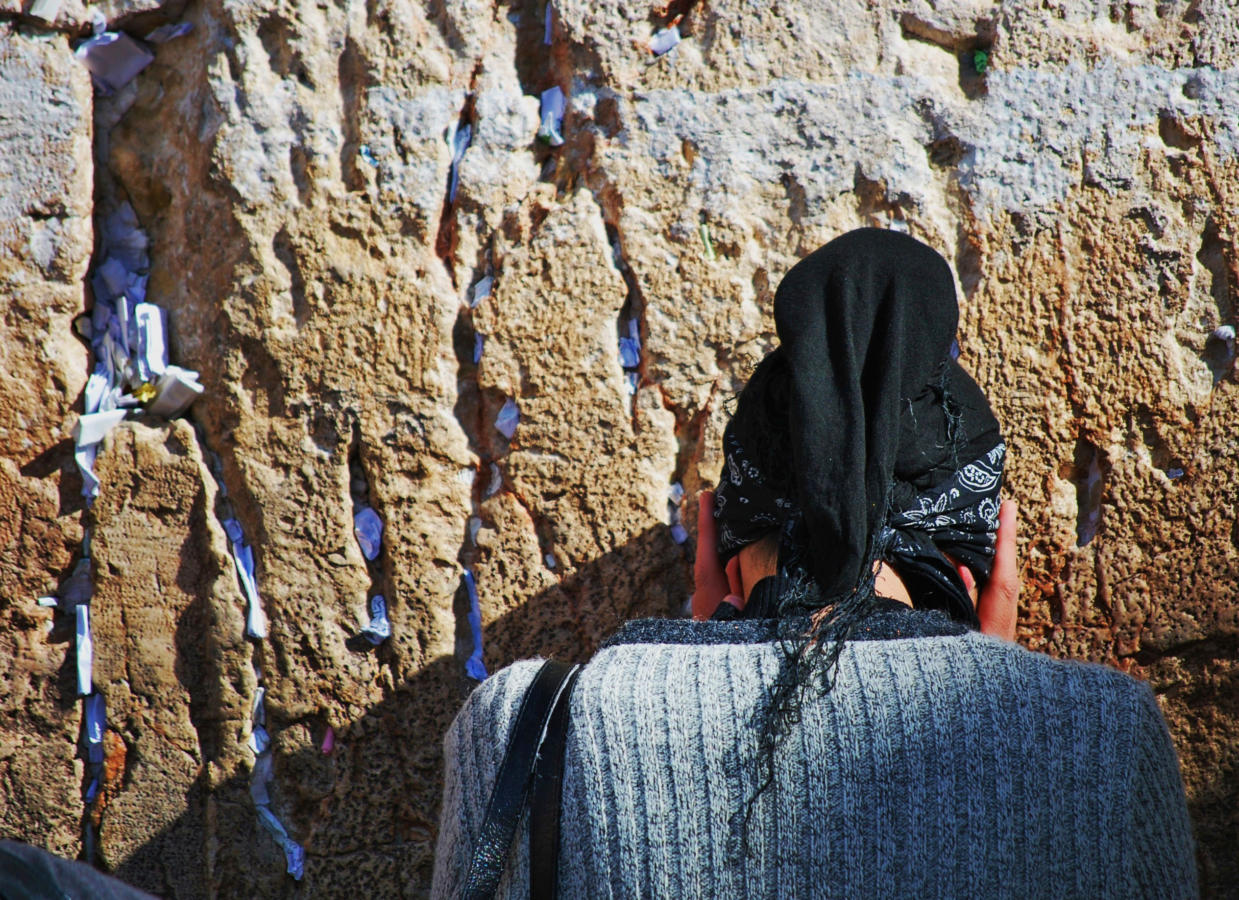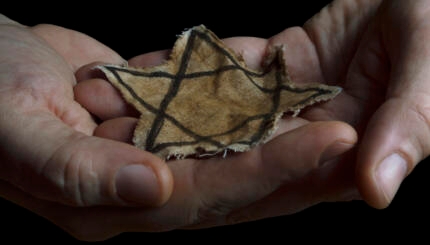Have you ever been in a relationship that ended? Or watched a great chance come and go? Or made a choice you later wished you could reverse? How many times in your life have you said “I should have” or “if only…” It is difficult enough to let go of something you have in hand. But often a large part of the pain comes from the sense of loss over what you could have had.
You would not engage in “what ifs” if you were happy with a current situation. Displeasure with it and sadness for squandered potential or lost opportunity can be incapacitating: It’s extremely difficult to stride ahead when you are continually looking behind you. The rabbis of the post-destruction decades recognized this. So they concentrated the period and practices of mourning to free the people, so they would be able to move forward with their lives. If in your mourning you focus on identifying what is wrong and figuring out how to make it right, the experience can be cathartic and constructive.
Stepping Back
That is exactly the purpose of a fast day: to give you a chance to momentarily retreat from your imperfect present, the imperfect world, to step back and indulge in your dissatisfaction with it, and then step forward and take action that will lead to positive change. Tisha B’Av allows you to experience loss for what was and what might have been, individually and collectively. If used well, it can help you create what can be, personally and communally.
There may be any kind of past loss or regret in your life whose hold you need to relinquish. But what is it Jewishly that you miss? If it’s the smell of chicken soup on Friday night, the sales techniques of Maxwell Street, the colors and characters of the Lower East Side, or Bubbe [grandmother] and Zaide‘s [grandfather’s] Yiddish-accented speech, you’ve got a case of nostalgia, the source of melancholy reminiscence, perhaps, but not a reason to cry. As the once-popular poster of an oversized bagel suggested, there’s more to 2,000 years of Jewish civilization than this.

Help us keep Jewish knowledge accessible to millions of people around the world.
Your donation to My Jewish Learning fuels endless journeys of Jewish discovery. With your help, My Jewish Learning can continue to provide nonstop opportunities for learning, connection and growth.
A concern for Tisha B’Av — which came about because the possibility of living a full Jewish way of life ended — should be the kinds of meaningful connections to the Jewish past, and future, you are missing. Lacking the knowledge to make time-honored traditions relevant and to infuse your everyday life with Jewish value, being illiterate about Judaism (can you explain , identify Abraham, and name the Twelve Tribes of Israel with the same ease you explain Thanksgiving, identify George Washington and name the original 13 American colonies?) — these are things to mourn. Having not had a Jewish summer camp experience, firsthand exposure to Israel, or an exceptional Hebrew school teacher are legitimate disadvantages to regret and worthwhile aspects of Jewish life to consider on Tisha B’Av.
Moving On
But once the day of mourning for what might have been ends, we stop “crying over spilled milk” and go out to fill the bottle. There’s still time for you to increase your knowledge and for your children to take advantage of the opportunities you missed.
In the collective arena, most of us find it difficult to identify with the moaning and weeping the Jews of past centuries went through on this holiday. Unlike them, we have Israel and position through our status as citizens of other countries. But if we step back from our seemingly secure position, we realize that we still lack much of what they mourned. We have not eliminated anti-Semitic persecution from the world or established the universal peace that guarantees a life of dignity, self-sufficiency, and mutual respect for all; we have not effected a spiritual reconciliation to accompany our renewed sovereignty over the Land, nor have we been able to achieve unity — regardless of UJA (United Jewish Appeal) slogans (“One People”) –which the Temple, as a national symbol and gathering place, promoted.
These deficits provide national goals to ponder during our day of withdrawal and introspection, and they have local communal implications. For instance: The senseless hatred that brought down the Temple is said to have been caused by “the root of all evil.” Even the position of spiritual leadership, Kohen Gadol [high priest], went to the highest bidder. In our communities and institutions today, is the situation much different than it was at the end of the Second Temple? Who gets the greatest honors in the synagogue? The top positions on organization boards? Should you be trying to influence organizations in your community to add requirements for scholarship and character so that along with the necessary financial leadership you have the intellectual, spiritual, and moral leadership models and direction critical for long-term success?
Traditional Weakness Associated With Tisha B’Av
Another example: The rabbis also blamed the destruction on (evil talk): gossip, rumor, innuendo, even saying nice things that could prompt someone to respond with a negative comment. Trying to eliminate it is undoubtedly even a much more difficult task than trying to change our communal culture. Let’s be realistic. How many of us can resist listening to or passing along a juicy tidbit?
The problem, which the rabbis considered one of the most serious offenses because of the destructive power of words, goes deeper. Even if a comment is not made initially with malicious intent, it can wind up causing serious irreparable damage. The remarks of individuals can have national repercussions. For instance, consider how you or the people around you express discontent with Israel. Is it done in constructive ways and without providing ammunition to our enemies? Does the criticism come out of sincere concern for the future of the country and its people, or because as a Jew you feel embarrassed by Israel’s actions?
Words — whose power we should think about on Tisha B’Av — can be tools as well as weapons, can build up as well as tear down. Think of ways you can be constructive. Soothe ruffled feathers. Take advantage of opportunities to counsel cooperation and mutual respect in communal settings, stressing common ground and common goals rather than differences. (And on the personal level, encourage your children so that they develop confidence in themselves, the ability to “conquer the land” — their own challenges — which the Israelites facing Canaan for the first time lacked.)
Rabbi Levi Yitzhkak of Berditchev, the master, said that we cannot expect to achieve the “rebuilt Jerusalem” of our collective dream until we eliminate from among ourselves the destructive forces that devastated Jerusalem. All of them (idolatry, adultery, murder, hatred) represented turnings away from the Jewish way of life, as does ignorance, one of the most destructive forces we face in today’s Jewish communal crisis.
The Chinese character for crisis consists of two symbols: one for danger, the other for opportunity. That combination sums up the history and meaning of Tisha B’Av. In past generations, emphasis was on the former, because the Jews continued to live in the wake of loss and the threat of persecution. So on Tisha B’Av they grieved over the destruction and passively hoped for the redemption.
Never before in history, because of the political and cultural environments in which they lived, could the Jews act on the opportunity; in response to the different threats we face, we can. While we still grieve for the loss of wasted possibilities and recognize the danger of not taking bold, positive steps, we do have the chance to bring redemption closer. It’s an opportunity you don’t want to miss.
Excerpted with permission from Celebrate! The Complete Jewish Holiday Handbook (Jason Aronson Inc.).



